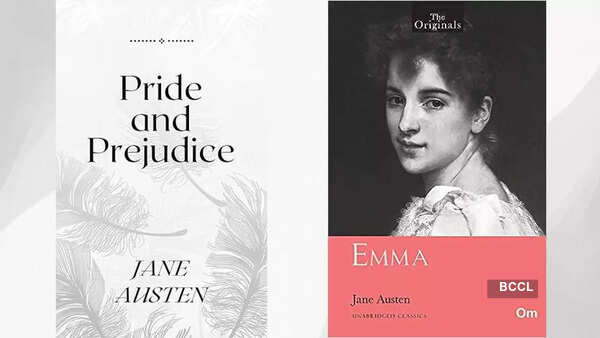Trending
This story is from September 17, 2023
Exploring Jane Austen's timeless writing style
Jane Austen, a renowned English novelist, is remembered for her timeless writing style that captivates readers across generations. One of her notable features is her subtle social commentary, seamlessly woven into her narratives. Austen's characters are well-developed, allowing readers to empathize with their experiences and personal growth. Her writing is infused with wit and irony, adding depth and humor to her works. Read the article to find more about the novelists writing style and how its impact over the readers present worldwide.

Photo: Canva
When we think of classic literature, one name that invariably comes to our minds is Jane Austen. Born in 1775, this English novelist remains a beloved figure in the world of literature, captivating readers with her insightful portrayals of society, memorable characters, and a writing style that continues to resonate through generations of readers across the world.Here we explore her timeless writing style which has touched many readers' hearts.
One of the hallmarks of Jane Austen's writing style is her subtle yet incisive social commentary. Her novels, such as ‘Pride and Prejudice’ and ‘Emma,’ are a reflection of the society she lived in, where class and marriage were pivotal. Austen's commentary on these themes is woven seamlessly into her narratives. In ‘Pride and Prejudice,’ Austen introduces us to Elizabeth Bennet and Mr. Darcy, two characters whose initial judgments of each other form the crux of the plot. Through their witty dialogues and the society that surrounds them, Austen dissects the complexities of class, marriage, and personal prejudices. Her writing style allows readers to perceive the underlying critiques without overtly stating them.

Austen's writing is infused with wit and irony, which adds depth and humor to her works. In ‘Northanger Abbey,’ she playfully satirizes the Gothic novel genre, as her heroine, Catherine Morland, allows her imagination to run wild. Austen's use of irony is evident as she gently mocks the sensationalism of these novels, using them as a backdrop to comment on the dangers of excessive romanticism. Moreover, in ‘Persuasion,’ Austen employs irony to emphasize the theme of second chances in love. Anne Elliot's enduring love for Captain Wentworth, despite societal expectations and misunderstandings, is a testament to Austen's ability to craft a story filled with subtle emotional resonance.
Jane Austen's dialogues are masterfully crafted and serve as a pivotal narrative device. Her characters engage in clever exchanges that reveal their personalities and motivations. In ‘Mansfield Park,’ the dialogue between Fanny Price and Henry Crawford highlights the tension between virtue and moral compromise. Austen uses dialogue to underline the characters' conflicting values, enriching the reader's understanding of their inner conflicts. In ‘Persuasion,’ Captain Wentworth's letter to Anne Elliot stands as one of the most poignant moments in Austen's novels. This letter is a testament to Austen's ability to convey deep emotions through the written word. It is a moving declaration of love, where the restrained passion in Wentworth's words resonates with readers, highlighting Austen's mastery of emotional expression.
The subtlety of social commentary
One of the hallmarks of Jane Austen's writing style is her subtle yet incisive social commentary. Her novels, such as ‘Pride and Prejudice’ and ‘Emma,’ are a reflection of the society she lived in, where class and marriage were pivotal. Austen's commentary on these themes is woven seamlessly into her narratives. In ‘Pride and Prejudice,’ Austen introduces us to Elizabeth Bennet and Mr. Darcy, two characters whose initial judgments of each other form the crux of the plot. Through their witty dialogues and the society that surrounds them, Austen dissects the complexities of class, marriage, and personal prejudices. Her writing style allows readers to perceive the underlying critiques without overtly stating them.
Character depth and development
Austen's characters are richly developed, and her writing style allows us to delve deep into their thoughts and emotions. Take ‘Sense and Sensibility,’ for instance, where she explores the contrasting personalities of the Dashwood sisters, Elinor and Marianne. Austen's prose gives life to their distinct characters, enabling readers to empathize with their joys and sorrows. In ‘Emma,’ the eponymous heroine undergoes significant personal growth. Austen's writing style allows us to witness Emma's transformation from a well-meaning but misguided matchmaker to a more self-aware and empathetic individual. The use of free indirect discourse, a technique where the narrator's voice blends with the character's thoughts, helps us understand Emma's inner world intimately.

Photo: Canva
Narrative wit and irony
Austen's writing is infused with wit and irony, which adds depth and humor to her works. In ‘Northanger Abbey,’ she playfully satirizes the Gothic novel genre, as her heroine, Catherine Morland, allows her imagination to run wild. Austen's use of irony is evident as she gently mocks the sensationalism of these novels, using them as a backdrop to comment on the dangers of excessive romanticism. Moreover, in ‘Persuasion,’ Austen employs irony to emphasize the theme of second chances in love. Anne Elliot's enduring love for Captain Wentworth, despite societal expectations and misunderstandings, is a testament to Austen's ability to craft a story filled with subtle emotional resonance.
Dialogue as a narrative device
Jane Austen's dialogues are masterfully crafted and serve as a pivotal narrative device. Her characters engage in clever exchanges that reveal their personalities and motivations. In ‘Mansfield Park,’ the dialogue between Fanny Price and Henry Crawford highlights the tension between virtue and moral compromise. Austen uses dialogue to underline the characters' conflicting values, enriching the reader's understanding of their inner conflicts. In ‘Persuasion,’ Captain Wentworth's letter to Anne Elliot stands as one of the most poignant moments in Austen's novels. This letter is a testament to Austen's ability to convey deep emotions through the written word. It is a moving declaration of love, where the restrained passion in Wentworth's words resonates with readers, highlighting Austen's mastery of emotional expression.
End of Article
FOLLOW US ON SOCIAL MEDIA








